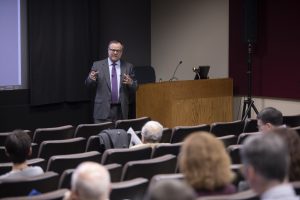UI Finance and Operations Office oversees UIHC construction projects after Modern Piping legal dispute
The office now oversees UI Hospitals & Clinics construction projects after the Modern Piping dispute over Children’s Hospital work.
The UI Stead Family Children’s Hospital is seen in September 2018.
November 22, 2019
Following the University of Iowa’s costly years long legal battle with construction firm Modern Piping over two major construction disputes, the Finance and Operations Office will now oversee all UI Hospitals and Clinics building projects.
The change comes after an appellate court earlier this year affirmed a district court’s order that the UI pay a $21.5 million arbitration award to Cedar Rapids-based contractor Modern Piping for its work on the UI Stead Family Children’s Hospital and Hancher Auditorium projects. As of May, the UI paid the full court-ordered sum after contending that problems such as delays and design changes plagued the projects.
After addressing the disputes that arose from the Children’s Hospital project, UI Senior Vice President for Finance and Operations Rod Lehnertz said Tuesday in an interview with The Daily Iowan, the UI determined a best path forward would be to have Facilities Management involved in overseeing UIHC projects.
UIHC’s Capital Management group previously oversaw the enterprise’s construction projects, Lehnertz said. The Finance and Operations Office still works with Capital Management and hospital administration in planning and coordination.
“A hospital of more than 4 million square-feet of critical care, patient, and health-care needs is different than a university, and that specific expertise, knowledge, touch points related to health care remains important,” Lehnertz said.
RELATED: University of Iowa pays Modern Piping for Children’s Hospital dispute
The report on the UI Faculty Senate’s review of the Finance and Operations Office, completed earlier this year and released this semester, stated that those interviewed for the review of the office “note that the adverse media attention generated by the arbitration award has led many alumni and legislators to express concerns about whether the university is able to prudently manage construction projects and prevent waste.”
The committee reported it was pleased to learn of the adjustments to UIHC capital-project management to incorporate the expertise of Finance and Operations officials. However, the committee recommended the Finance and Operations Office and the President’s Office “consider clarifying the nature of the challenges that arose in the construction of the Children’s Hospital, how the university responded, and what lessons were learned — and changes made — to ensure that a similar situation does not happen again.”
In response to the concerns about the UI’s responsible fiscal management of construction projects, Lehnertz said, “One can argue it’s one of or part of the reason that we did the consolidation. The vast majority of projects on the main campus have been in are delivered both on time and at or under budget.”
RELATED: UI considers using third party to create final Children’s Hospital construction records
That was evident in the UI’s handling of recovery efforts after the June 2008 flood, Lehnertz said. During the post-flood period, he said more than $1 billion in construction work was underway on the campus in a community of less than 100,000 people.
“Save the Children’s Hospital, the other projects were all delivered on time and within the budget despite not just the busiest construction workload in the history of the campus, but also all of them starting in the … winter of 2014, which was the coldest winter on record and forcing weeks not days of contractor work delays due to the weather,” he said.
Lehnertz said he recognizes the review committee’s curiosity about the Children’s Hospital project and added that his office has learned from the project’s resulting challenges.
“There’s an example of a refinement that has us looking forward to a consolidated, one University of Iowa approach to delivering projects which has and will increase consistency, reliable delivery of the projects, and shared successes and shared lessons from those projects,” he said.






